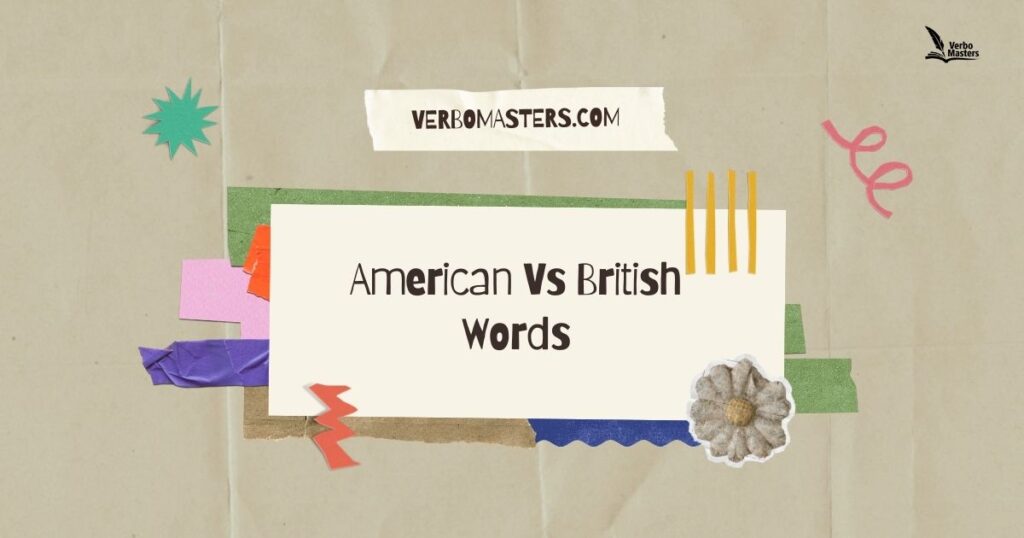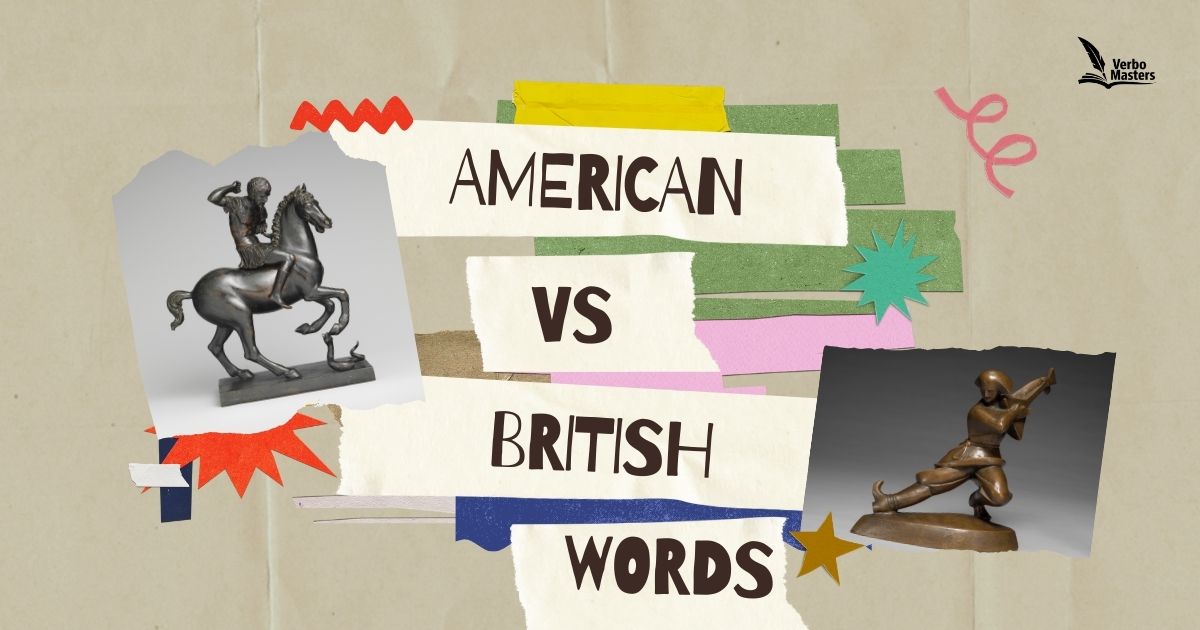American and British English may sound similar, but they use different words for many everyday things. From food to clothing, the vocabulary can really vary. You might ride an elevator in the U.S., but take a lift in the U.K.
These differences can be fun, interesting, and even a little confusing at times. Whether you’re traveling, watching a movie, or chatting online, knowing both helps a lot. Let’s explore the most common American vs. British words you should know!
You can also read; 150 Professional way to say I am confused
American Vs British Words

chart of 150 common American vs British English vocabulary words:
| American English | British English |
| Apartment | Flat |
| Elevator | Lift |
| Truck | Lorry |
| Flashlight | Torch |
| Diaper | Nappy |
| Cookie | Biscuit |
| French fries | Chips |
| Chips | Crisps |
| Sweater | Jumper |
| Trash can | Bin |
| Soccer | Football |
| Faucet | Tap |
| Vacation | Holiday |
| Drugstore | Chemist |
| Pants | Trousers |
| Underwear | Pants |
| Cell phone | Mobile phone |
| Mailbox | Postbox |
| Sidewalk | Pavement |
| Gasoline | Petrol |
| Candy | Sweets |
| Stroller | Pram |
| Pacifier | Dummy |
| Zucchini | Courgette |
| Eggplant | Aubergine |
| Closet | Wardrobe |
| Check (money) | Cheque |
| Eraser | Rubber |
| Truck (open bed) | Pickup |
| Schedule | Timetable |
| Sneakers | Trainers |
| Overpass | Flyover |
| Flash drive | Memory stick |
| Math | Maths |
| Gas station | Petrol station |
| Sweats | Trackies |
| Faucet handle | Tap handle |
| Restroom | Toilet/loo |
| Windshield | Windscreen |
| Hood (of car) | Bonnet |
| Trunk (of car) | Boot |
| Line (queue) | Queue |
| Realtor | Estate agent |
| Round trip | Return ticket |
| One-way | Single ticket |
| Apartment building | Block of flats |
| Trash | Rubbish |
| Movie theater | Cinema |
| Movie | Film |
| Grade (school) | Year |
| Principal | Headteacher |
| Zip code | Postcode |
| Band-Aid | Plaster |
| Period (punctuation) | Full stop |
| Faucet | Tap |
| Cookie sheet | Baking tray |
| Ground beef | Mince |
| Broiler | Grill |
| Stove | Cooker |
| Arugula | Rocket |
| Cilantro | Coriander |
| Oatmeal | Porridge |
| Jelly | Jam |
| Jello | Jelly |
| Trash day | Bin day |
| First floor | Ground floor |
| Second floor | First floor |
| Zipper | Zip |
| Parking lot | Car park |
| Faucet aerator | Tap nozzle |
| Fire department | Fire brigade |
| Cotton candy | Candyfloss |
| Turtleneck | Polo neck |
| Suspenders | Braces |
| Vest | Waistcoat |
| Sweater vest | Tank top |
| Bathrobe | Dressing gown |
| Post | |
| Check mark | Tick |
| Counterclockwise | Anticlockwise |
| Faucet | Tap |
| Cornstarch | Cornflour |
| Scotch tape | Sellotape |
| Trash bag | Bin liner |
| Antenna | Aerial |
| Attorney | Solicitor |
| District attorney | Crown prosecutor |
| License plate | Number plate |
| Resume | CV (Curriculum Vitae) |
| Janitor | Caretaker |
| Pacifier | Dummy |
| Zip | Fastener |
| Cellphone plan | Mobile tariff |
| Public school | State school |
| Private school | Public school |
| Sweater | Jumper |
| Soda | Fizzy drink |
| Vacation | Holiday |
| Pharmacy | Chemist |
| ATM | Cashpoint |
| Purse (for women) | Handbag |
| Purse (coin holder) | Purse |
| Flashlight | Torch |
| Candy bar | Chocolate bar |
| Mailman | Postman |
| Store | Shop |
| Shopping cart | Trolley |
| Eggplant | Aubergine |
| Faucet | Tap |
| Garbage disposal | Waste disposal unit |
| Popsicle | Ice lolly |
| Break time | Tea break |
| Garbage truck | Dustbin lorry |
| Takeout | Takeaway |
| Hoodie | Hooded top |
| Rain boots | Wellies |
| Resume | CV |
| Zip lock bag | Resealable bag |
| Flashcards | Revision cards |
| Fall (season) | Autumn |
| Curb | Kerb |
| Round trip ticket | Return fare |
| Gas bill | Energy bill |
| Elevator shaft | Lift shaft |
| Crosswalk | Zebra crossing |
| License | Licence |
| Subway | Underground |
| Railroad | Railway |
| Engineer (train) | Train driver |
| Car lot | Car dealership |
| Motor oil | Engine oil |
| Outlet mall | Retail park |
| Nail polish | Nail varnish |
| Dumpster | Skip |
| Potluck | Bring-and-share |
| Silverware | Cutlery |
| Broil | Grill |
| Pantsuit | Trouser suit |
| Sweats | Joggers |
| Cell tower | Phone mast |
| Trash day | Bin collection day |
Let me know if you’d like this in downloadable format or with images!
FAQs
What’s the main difference between American and British English?
The biggest differences are in vocabulary, spelling, and pronunciation. Many words are used differently even though they mean the same thing.
Is British English more formal than American English?
Not necessarily. Both can be formal or informal depending on the context. However, British English may sound more formal due to tone and phrasing.
Why do some words have different spellings?
Spelling differences, like “color” (US) vs. “colour” (UK), mostly come from historical influences and language reform efforts over time.
Do Americans understand British vocabulary?
Most of the time, yes—especially with common terms. But some words can cause confusion if they’re very regional or rarely used in one country.
Are grammar rules different in British and American English?
Some rules differ slightly, such as collective nouns being singular in American English but often plural in British English. Still, both are mostly similar.
Which version of English should I learn?
It depends on your goals. If you’re moving to the U.S., learn American English. If you’re working with people in the U.K., go with British English.
Is pronunciation very different between the two?
Yes, there are noticeable accent and pronunciation differences. Words like “schedule” or “advertisement” sound quite different in each version.
Do both versions use the same punctuation rules?
Most punctuation rules are the same, but there are slight differences. For example, Americans often use double quotation marks, while Brits prefer single.
Are movie and TV scripts written differently?
Yes, screenwriters often adapt scripts depending on the audience. That includes vocabulary, spelling, and cultural references to match the region.
Is one version of English better than the other?
No version is better—just different. Both are correct and widely accepted. The key is to stay consistent with whichever version you choose.
Conclusion
American and British English share the same roots but often use different words for the same things. From daily items to professional terms, the vocabulary can vary a lot. These differences make language learning both fun and sometimes a little confusing.
Knowing both versions helps when watching movies, traveling, or working internationally. Whether you’re in an American “apartment” or a British “flat,” it’s all about communication. Learning the variations expands your understanding and confidence.

I’m John Smith, a language enthusiast dedicated to helping writers, students, and professionals master the art of clear and effective communication. Whether you’re looking for grammar tips, writing guides, or common mistake corrections, you’ll find valuable insights to improve your language skills. Let’s make grammar simple and fun!

